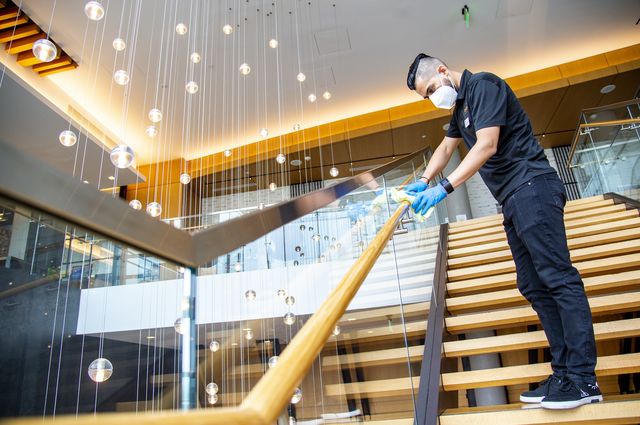Does the post-COVID era require a different skillset from housekeepers?
7 experts shared their view
The prominence of the housekeeping function has seen a revival in recent years. While its contribution was underappreciated for many decades, there has been a recent awakening to the department's significant impact on shaping the guest experience and the positive impact a well-managed team can have on the hotel's bottom line. Hotel schools now teach housekeeping management again, the hotel leaders are tuning in to the team and management talent is injected.
This renewed management attention results in metrics and KPIs playing a growing role while the introduction of technology pushes many traditional managers to their limits.
With COVID-19 evolving the daily cleaning effort into an increasingly complex project management endeavour, and responsibility and accountability increasing exponentially in the face of increased liability, is the traditional housekeeping expertise still relevant or does the new world order require a different skillset from housekeepers?

This viewpoint is co-created with Optii Solutions Inc.
More information
The housekeeping skill-set post-COVID has evolved, not in the typical hard skills of cleaning, but on the soft skills of caring and empathy. The shift is not to do with the skill-set, but with the mindset. COVID has propelled TRUST to the forefront, critical to both the guest and the reputation of the business. The housekeeper has to care about the health and safety of the guest, and be trusted to follow all the cleaning protocols religiously, resisting the pressures from front office to turn around rooms quickly.
The work for the housekeeper has got harder, with most guests accepting their rooms not being cleaned throughout their stay, resulting in a board of check out rooms all requiring in-depth cleaning. The role is no longer just about making guest rooms and public areas 'clean', but ensuring these areas are free from infectious sources.
In conclusion, it is not a different skill-set, but a change in routine, mindset and emotional strength. Strong leadership is critical to motivate and manage the housekeepers, and to help them adopt and adapt to the new routine, in an area where introducing change has always been difficult. Strong, consistent and emotionally connected leadership is even more critical than ever before.
In the early stages of the "housekeeping technology revolution," I struggled with change, however, it was clear that in order to remain relevant I had to evolve and embrace change pushing myself out of my comfort zone and more importantly staying on top of trends and innovations in our industry.
7 months down the COVID-19 path and our responsibilities towards our Team Members, Guests, Contractors, and how we conduct our business has changed. Overnight we have been inundated with a large amount of information in relation to chemicals, equipment, and solutions that assist in managing cleanliness, hygiene, and sanitation protocols.
Processing all this information and in turn creating hygiene and sanitation protocols and implementation plans for 7500+ hotel rooms and 4 integrated resorts has taken the combined skill set of a number of experienced career Housekeepers combining traditional housekeeping expertise & knowledge and the modern hotel housekeeping operations that we operate nowadays.
Coronavirus is raising the stakes for hotels and housekeepers everywhere. To spur travel, our industry needs to not only promise cleanliness, but deliver on it, or there will be no industry. The knowledge and wisdom held by housekeeping professionals has never been more relevant, but it is no longer enough. Lapses in cleanliness will have tremendous costs and risks for hotels, so we need to raise our game.
Housekeeping professionals need to drive innovation in their areas to improve effectiveness and productivity - margins are under attack, so we need to figure out how to do more with less. They need to improve data literacy and look for ways such as systems, beacon technologies, or video analytics to measure traffic volumes, cleaning efficacy, and performance at an individual level for staff. They need to borrow tools and innovations from other industries such as the routine use of A3 swabs to measure cleanliness or the use of nanotechnologies to repel dirt and germs. Housekeepers should also embrace automation to help with key tasks such as floor scrubbing, vacuuming, or sanitizing. Finally, they need to market the work they have done to the public and their organizations. Cleaning used to be hidden, now it should be on display to reassure stakeholders. In addition, cleaning needs to be “tangibalized” through lighting, smell, visible sign-offs, and other cues that reassure the public that the hotel is fulfilling its promise of cleanliness.
In the face of COVID-19, it seems that housekeeping professionals are required to (re-)activate their skill set; which already includes the management of complex projects.
For the seasoned housekeeping professional managing the complex task of ensuring cleanliness, hygiene, and COVID-19 safety for guests and staff, is most likely not an issue. In the past housekeeping professionals where 'in charge' of running the hotel's key department, delivering great service to guests, while managing and motivating a diverse workforce. At the same time, housekeeping professionals were involved and/or managing complex CAPEX projects for the hotels.
Unfortunately, housekeeping professionals were reduced to cleaners and room checkers and their skill set was not necessarily utilized - not too sure why, but cost-saving goals and a lack of appreciation of the work, most likely played a role.
Housekeeping is evolving and in recent years many housekeeping operations were moved into the 21st century. COVID-19 will force hotels and housekeeping departments to embrace change (quickly), educate existing staff and management, and train the next generation of housekeepers to ensure the key function of housekeeping can deliver what is expected.
The sudden changes and swift momentum triggered by COVID-19 have placed many housekeepers outside of their comfort zone without advance warning. Just like other department heads, they suddenly found themselves having to deal with a situation they were not trained, nor prepared for.
The traditional skillset remains relevant and will continue to form the foundational core for the role. The increased complexity of managing cleaning operations with new variables like infrequent stayover cleans, idle periods for decontamination, and the extra accountability introduced by hygiene responsibilities with little room for error require tighter processes than ever before. Cost control advances in importance once again as the impact of additional cleaning costs need to be mitigated.
The sophistication is increasing and the standing of housekeepers within the management team has increased in recent years. As a long-time advocate for housekeeping, I am encouraged to see more management attention and talent injection. While high-end properties have senior team members in these positions, the other 3 quartiles of executive housekeepers globally are often lacking formal education and management training to prepare them for the increased sophistication of their roles. I hope that more management training and appreciation will be afforded to those that may be struggling and thus enable them to grow professionally.
Hotels are defined as establishments providing accommodation and the guardians of the rooms' product deserve all the training and tools to deliver hygienically clean rooms consistently and profitably.
Aside from skills relating to hygiene and perhaps even technology and hygiene, I believe the most important skill during this pandemic for housekeeping, but anyone for that matter, is resilience.
To have resilience yourself, but also resilient leadership is vital to keep yourself, your department and your organisation going.
Resilient leadership is about taking decisive action to secure stabilizing the organisation, while keeping the triple bottom line in mind. Even more so being empathic and compassionate and understanding the needs of all stakeholders. A resilient leader deals effectively with change and innovates accordingly.
What are ways to work on your resilience?
Keeping things in perspective, avoid seeing crises as insurmountable issues, accept that only change is constant, build connections, ask and give support and most importantly take care of your physical and mental state.
I have always believed that a well organized and vigilant housekeeping department could pass any hygiene test. Detailed training and record-keeping is the key and utilizing technology platforms to record this information is critical.







